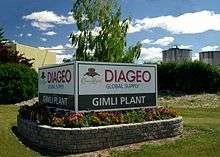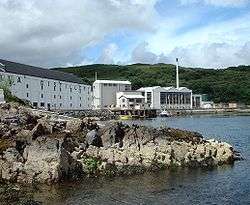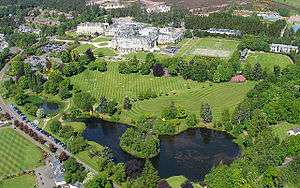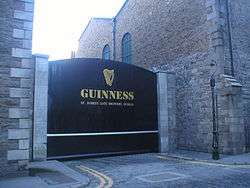Diageo
|
| |
| Public limited company | |
| Traded as | |
| Industry | Beverages |
| Founded |
1997 (London, United Kingdom) |
| Headquarters | Park Royal, London, England, United Kingdom |
Key people |
Franz Humer (Chairman) Ivan Menezes (CEO) |
| Products | Alcoholic beverages: spirits, beer and wine |
| Revenue | £10.813 billion (2015)[1] |
| £2.797 billion (2015)[1] | |
| £2.467 billion (2015)[1] | |
Number of employees | 33,000 (2016)[2] |
| Subsidiaries | United Spirits |
| Website |
www |
Diageo plc (/diːˈɑːʒiːoʊ/; other possibilities are /daɪˈʌʒiːoʊ/[3] or /diˈædʒioʊ/)[4] is a British multinational alcoholic beverages company, with its headquarters in London, England. It is the world's largest producer of spirits and a major producer of beer.[5][6]
Diageo's brands include Smirnoff (the world's best-selling vodka),[7] Johnnie Walker (the world's best-selling blended Scotch whisky),[8] Baileys (the world's best-selling liqueur),[9] and Guinness (the world's best-selling stout).[10][11] It also owns 34% of Moët Hennessy, which owns brands including Moët & Chandon, Veuve Clicquot and Hennessy.[12][13] It sells its products in over 180 countries and has offices in around 80 countries.[14][15]
Diageo has a primary listing on the London Stock Exchange and is a constituent of the FTSE 100 Index. It has a secondary listing on the New York Stock Exchange.
Name
Diageo is an invented name that was created by the branding consultancy Wolff Olins in 1997.[16] The name is composed of the Latin word "dia", meaning day, and the Greek root "geo", meaning world, and is meant to reference the company giving pleasure every day, everywhere.[16][17]
History
Diageo was formed in 1997 from the merger of Guinness and Grand Metropolitan.[18] The creation was driven by the executives Anthony Greener and Philip Yea at Guinness[19] plus George Bull and John McGrath of Grand Metropolitan.[20] Anthony Greener was the first executive chairman.[21] Shares in Diageo began trading on the London Stock Exchange on 17 December 1997.[22]
Diageo owned Pillsbury until 2000 when it was sold to General Mills.[23] In 2002, Diageo sold the Burger King fast food restaurant chain to a consortium led by US firm Texas Pacific for $1.5 billion.[24]
In February 2011 Diageo agreed to acquire the Turkish liquor company Mey Icki for US$2.1 billion.[25][26]
In May 2012, Diageo agreed to acquire Ypioca, the largest-selling brand of premium cachaça in Brazil, for £300 million.[27]
In June 2012 Diageo announced a £1 billion investment in Scotch whisky production over the following five years, with at least one new distillery to be constructed, several existing facilities to be expanded, and overall production capacity to be increased by 30 to 40 per cent.[28][29] This did not, however, involve retaining the original Johnnie Walker plant, in Kilmarnock, which had already closed its doors in March the same year.[30]
In November 2012 Diageo agreed to acquire a 53.4% stake in the Indian spirits company United Spirits for £1.28 billion.[31][32]
In 2013 Diageo joined leading alcohol producers as part of a producers' commitments to reducing harmful drinking.[33]
In November 2014 Diageo agreed to sell Bushmills Irish whiskey in exchange for $408 million and full ownership of tequila brand Don Julio.[34]
In October 2015, Diageo announced the sale of most of its wine business to Treasury Wine Estates.[35] Other brands, such as Navarro Correas and Chalone Vineyard, were sold separately.[36]
In March 2016 the company sold Grand Marnier, a cognac and bitter orange-based liqueur, to Italian aperitif maker Campari Group.[37]
Products
Diageo's beverage brands include:[38]
- Beer: Guinness, Tusker, Smithwick's, Harp Lager, Kilkenny, Kaliber (non-alcoholic), Windhoek
- Scotch whisky: Johnnie Walker, Buchanan's, Cardhu, Justerini & Brooks (J&B), Bell's, Black & White, White Horse, Logan, Caol Ila, Vat 69, Oban, Talisker, Lagavulin, Glen Ord, Glenkinchie, Dalwhinnie, Cragganmore, Clynelish, Singleton, Haig, Royal Lochnagar, Glen Elgin, Knockando, The Dimple Pinch
- Vodka: Smirnoff, Cîroc, Silent Sam, Popov, Ketel One
- Gin: Gordon's, Tanqueray, Booth's, Nolet's Gin
- Rum: Captain Morgan, Bundaberg, Pampero, Cacique, Myers's, Zacapa
- Bourbon: Bulleit, Orphan Barrel[39]
- American Whiskey: Seagram's Seven Crown
- Canadian whisky: Crown Royal, Seagram's VO
- Tennessee whiskey: George Dickel
- Tequila: Don Julio, Peligroso, DeLeón
- Schnapps: Black Haus, Rumple Minze
- Baijiu: Shui Jing Fang, Nếp Mới
- Mixed drinks: Archers, Pimm's, Jeremiah Weed, Smirnoff Cocktails
- Liqueur: Baileys, Sheridans, Yukon Jack, Godiva
Diageo also distributes Unicum (Hungarian liqueur), its lighter-bodied variant Zwack, and Grand Marnier which is distributed by Diageo in many markets, including exclusively in Canada, and a deal was reached in 2009 to expand significantly this partnership in Europe.
Operations
Diageo is the world's biggest whisky producer with malt distilleries open to the public at Blair Athol, Glenkinchie, Dalwhinnie, Royal Lochnagar, Cragganmore, Cardhu, Glen Ord, Clynelish, Talisker, Oban, Caol Ila and Lagavulin.[40] Other distilleries not open to the public include Linkwood,[41] Knockando,[42] Auchroisk,[43] Benrinnes,[44] Cameron Bridge,[45] Dailuaine,[46] Dufftown,[47] Cascade Hollow,[48] Glen Elgin,[49] Strathmill,[50] Teaninich,[51] Mannochmore,[52] Mortlach[53] and Glenlossie.[54]
It also has a very large distillery at Roseisle in Speyside.[55]
Furthermore, Diageo owns a 34% stake in the Moet Hennessy drinks division of French luxury goods company LVMH.[56]
-

Diageo's Gimli Plant in Gimli, Manitoba, Canada, the global supply plant for Crown Royal (top selling Canadian whiskey in United States[1])
-

Caol Ila distillery on the Isle of Islay, Scotland
-

Sterling Vineyards in Napa Valley, California
-

Gleneagles Hotel in Auchterarder, Scotland
-

St James Gate Guinness Brewery in Dublin, Ireland
-

Diageo world headquarters in Park Royal, London
- ^ "Top 12 Best Selling Whiskey Brands in the World". Listaka. Retrieved 20 March 2016.
Head office
Diageo's head office is in Park Royal, London Borough of Brent,[57][58] on a former Guinness brewery property.[59] The brewery was closed in 2004; it had produced beer since 1936.[60]
In 1996, Diageo moved to a head office facility in Henrietta Place, in the Marylebone district of the City of Westminster in London.[59][61] In 2009, Diageo announced that it was closing the Henrietta Place facility as part of a cost reduction programme. Diageo moved its employees to the Park Royal site. During that year, about 1,000 employees were located at the Henrietta Place and Park Royal offices. The lease in the Henrietta facility was scheduled to expire in 2010.[59]
Controversies
In December 2003, Diageo provoked controversy over its decision to change its Cardhu brand Scotch whisky from a single malt to a vatted (blended) malt whilst retaining the original name and bottle style. Diageo took this action because it did not have sufficient reserves to meet demand in the Spanish market, where Cardhu had been successful. After a meeting of producers, Diageo agreed to make changes.[62] On 4 February 2004, Diageo restated last fiscal year's earnings under U.S. accounting rules, reducing net income by 53 million pounds, or $97 million.[63] In 2006, the Cardhu brand quietly changed back to being a single malt.[64]
In July 2009, Diageo announced that, after nearly 200 years of association with the town of Kilmarnock, Scotland they would be closing the Johnnie Walker blending and bottling plant[65] as part of restructuring to the business. This would make 700 workers unemployed and caused outrage from press, local people and politicians. A campaign against this decision was launched by the local SNP MSP Willie Coffey and Labour MP Des Browne. A petition was drawn up against the Diageo plans, which also involves the closure of the historic Port Dundas Grain Distillery in Glasgow.[66] Part of the Johnnie Walker operation will be moved to a Diageo site at Leven, Fife, with the creation of 400 jobs there.[67] As part of this expansion in Leven, Diageo culled a herd of roe deer living on the site to make way for new buildings.[68]
In February 2009, it was reported in The Guardian that the company had restructured itself so as to avoid paying tax in the UK.[69]
The National Puerto Rican Coalition planned to run a series of ads in New York City and Puerto Rico urging a boycott of Diageo-owned alcoholic drinks to protest the corporation’s production move of its Captain Morgan rum from Puerto Rico to the U.S. Virgin Islands,[70] which will provide it with $2.7 billion in tax benefits over 30 years.[71]
In 2011, Diageo agreed to pay more than $16 million to settle U.S. civil regulatory charges that it made improper payments to foreign officials. Regulators accused the British company of violating the U.S. Foreign Corrupt Practices Act through its subsidiaries to obtain lucrative sales and tax benefits for its Johnnie Walker and Windsor Scotch whiskeys and other brands. The SEC said that from 2003 to 2009, Diageo paid $2.7 million to foreign officials in India, Thailand, and South Korea through its subsidiaries. The settlement includes $11.3 million in disgorgement of profits, plus $2.1 million in interest and a $3 million penalty. "For years, Diageo's subsidiaries made hundreds of illicit payments to foreign government officials," SEC Associate Director of Enforcement Scott Friestad said in a statement. "As a result of Diageo's lax oversight and deficient controls, the subsidiaries routinely used third parties, inflated invoices, and other deceptive devices to disguise the true nature of the payments."[72]
On 9 May 2012 Scottish Craft brewery BrewDog revealed that Diageo had threatened to withdraw funding from BII Scotland's annual awards if BrewDog was to be named winner of the Best Bar Operator award. Diageo was forced to issue an apology.[73][74][75]
In 2015, Diageo offended survivors of rape and sexual abuse with an advertising campaign showing a young girl being blamed for having been drunk at the time and, moreover, for having an alcoholic mother. The director of Rape Crisis Network Ireland said Diageo "blames victims of sexual violence for the crimes that have been committed against them. The belief that drunk girls are ‘asking for it’ is one that needs to be strongly challenged as it is one that we know perpetrators use to select and target their victims knowing this cultural attitude will mean they get away with it. [...] This is a harmful, regressive and hurtful message which targets the vulnerable. Survivors of sexual violence should never be used in this manner. This latest ad builds on the shaming of women theme that can be seen in much drink related campaigning. The out-of-control campaign which started by asking women if they were ‘embarrassed’ while they were being photographed without their consent in a potentially compromising position, has now progressed to blaming victims of rape for their own rape."[76]
In November 2016 Diageo announced its intention of selling at auction Sir Edwin Landseer's iconic 1851 painting The Monarch of the Glen – which the company owns, but which has been on loan to the National Museum of Scotland in Edinburgh since 1999 – as it has "no direct link to our business or brands". The sale is expected to raise over £10 million.[77] Ian Jack, writing in the Guardian, compared the proposed sale to "feeding old masters into the boilers of luxury liners to keep the steam up", and stated that "any business with a sense of history would give the picture to a public gallery in Scotland, the place without which both the business and the picture would be nothing. It would be the decent thing."[78]
References
- 1 2 3 "Annual Report 2015" (PDF). Retrieved 20 March 2016.
- ↑ "Our people". Diageo. Retrieved 20 March 2016.
- ↑ "you tube". you tube. 2010-08-26. Retrieved 2014-05-18.
- ↑ The only pronunciation in the Longman Pronunciation Dictionary
- ↑ Thompson, James (27 August 2010). "Johnnie Walker popularity helps Diageo to toast profits". The Independent. UK. Retrieved 29 August 2010.
- ↑ "Categories". Diageo plc. Retrieved 29 August 2010.
- ↑ "Diageo says would look at Absolut if up for sale". Reuters. 14 March 2007. Retrieved 23 October 2011.
- ↑ "Diageo and the brands that make the global drinks giant". London: The Telegraph. 7 June 2011. Retrieved 23 October 2011.
- ↑ "Diageo's heady cocktail is best left on the shelf". London: The Independent. 10 July 2003. Retrieved 23 October 2011.
- ↑ "A round of applause". The Jakarta Post. 12 September 2009. Retrieved 23 October 2011.
- ↑ "Our Brands". Diageo plc. Retrieved 21 June 2011.
- ↑ "Wines". Diageo plc. Retrieved 29 August 2010.
- ↑ Boyle, Catherine; Walsh, Dominic (22 April 2009). "LVMH denies talk of Diageo bid for Moët Hennessy". The Times. UK. Retrieved 29 August 2010.
- ↑ "About Us". Diageo plc. Retrieved 29 August 2010.
- ↑ "Famous Brewer Expands with National Launch of Guinness Black Lager". PR Newswire. 24 August 2011. Retrieved 24 March 2012.
- 1 2 "Diageo Case Study". Wolff Olins. Retrieved 6 June 2012.
- ↑ Yates, Andrew (27 November 1997). "Guinness' new name gets shareholder thumbs down". The Independent. Retrieved 6 June 2012.
- ↑ "Spirits soar at Diageo". Findarticles.com. 2005. Retrieved 18 April 2011.
- ↑ "Board Announcements at Diageo". 4 May 1999. Retrieved 24 March 2012.
- ↑ Griffiths, Ian (18 May 1997). "Profile: John McGrath – The man who'll mix the drinks". The Independent. Retrieved 24 March 2012.
- ↑ "A liquid lunch". Forbes.com. Retrieved 2016-10-24.
- ↑ Yates, Andrew (18 December 1997). "Market bids farewell to an old name as Diageo makes debut". The Independent. Retrieved 6 June 2012.
- ↑ "Diageo sells Pillsbury to General Mills". Findarticles.com. 23 December 2002. Retrieved 18 April 2011.
- ↑ "Diageo sells Burger King". Findarticles.com. 23 December 2002. Retrieved 18 April 2011.
- ↑ "Diageo in $2.1 Billion Deal for Turkish Liquor Maker". The New York Times. 21 February 2011. Retrieved 6 June 2012.
- ↑ "Diageo's Turkish delight at raki swoop". The Scotsman. 19 February 2011. Retrieved 6 June 2012.
- ↑ Chesters, Laura (29 May 2012). "Diageo gets the taste for a cocktail with Brazilian spirit". The Independent. Retrieved 31 May 2012.
- ↑ Thomas, Nathalie (6 June 2012). "Diageo to invest £1bn in Scotch whisky". The Telegraph. Retrieved 6 June 2012.
- ↑ "Scotch whisky firm, Diageo, to invest £1bn". BBC News. 6 June 2012. Retrieved 6 June 2012.
- ↑ "Johnnie Walker whisky plant closes in Kilmarnock". BBC News. BBC. 23 March 2012. Retrieved August 7, 2012.
- ↑ "Diageo buys majority stake in India's United Spirits". BBC News. 9 November 2012. Retrieved 10 November 2012.
- ↑ "Diageo does $2.1 billion deal for India's United Spirits". Reuters. 9 November 2012. Retrieved 10 November 2012.
- ↑ "Home | Producers' Commitments". Producers' Commitments. Retrieved 2015-12-23.
- ↑ "Diageo Gets Full Control of Don Julio in Swap for Bushmills". Bloomberg L.P. 3 November 2014. Retrieved 23 December 2014.
- ↑ Inc, M. Shanken Communications (2015-10-14). "TWE To Acquire Diageo's Wine Business For $600 Million". Shanken News Daily. Retrieved 2016-07-28.
- ↑ "Foley Family Wines Buys Chalone Vineyards". WineSpectator.com. Retrieved 2016-07-28.
- ↑ "Gruppo Campari to buy brandy brand Grand Marnier". FT.com. 15 March 2016. Retrieved 6 July 2016.
- ↑ "our brands". Diageo. Retrieved 18 April 2011.
- ↑ Hansell, John (29 January 2014). "Diageo's Orphan Barrel Whiskey Project". Whiskey Advocate. Retrieved 25 June 2014.
- ↑ "Discovering Diageo's Distilleries". Great Scotland. Retrieved 20 March 2016.
- ↑ "Linkwood". Whisky.com. Retrieved 20 March 2016.
- ↑ "Knockando". Whisky.com. Retrieved 20 March 2016.
- ↑ "Auchroisk". Whisky.com. Retrieved 20 March 2016.
- ↑ "Benrinnes". Whisky.com. Retrieved 20 March 2016.
- ↑ "Cameron Bridge". Whisky.com. Retrieved 20 March 2016.
- ↑ "Dailuaine". Whisky.com. Retrieved 20 March 2016.
- ↑ "Dufftown". Whisky.com. Retrieved 20 March 2016.
- ↑ "George Dickel". Whisky.com. Retrieved 20 March 2016.
- ↑ "Glen Elgin". Whisky.com. Retrieved 20 March 2016.
- ↑ "Strathmill". Whisky.com. Retrieved 20 March 2016.
- ↑ "Teaninich". Whisky.com. Retrieved 20 March 2016.
- ↑ "Mannochmore". Whisky.com. Retrieved 20 March 2016.
- ↑ "Mortlach". Whisky.com. Retrieved 20 March 2016.
- ↑ "Glenlossie". Whisky.com. Retrieved 20 March 2016.
- ↑ "Diageo opens the first major new whisky distillery for a generation". The Guardian. 3 October 2010. Retrieved 20 March 2016.
- ↑ Walsh, Dominic; Boyle, Catherine (23 April 2009). "LVMH denies being in Moet sale talks with Diageo". The Times. London.
- ↑ "Diageo Contacts." Diageo. Retrieved 1 September 2011. "Diageo plc Lakeside Drive Park Royal London NW107HQ"
- ↑ "Brent Boundary (approximate)." London Borough of Brent. Retrieved 1 September 2011.
- 1 2 3 Dunkley, Jamie. "Drinks maker Diageo to close London office." The Daily Telegraph. 20 March 2009. Retrieved 1 September 2011.
- ↑ Innes, John. "Guinness closes UK brewery." The Scotsman. 16 April 2004. Retrieved 1 September 2011.
- ↑ "Contact us." Diageo. Retrieved 15 December 2009. "main content Diageo plc 8 Henrietta Place LONDON W1G ONB"
- ↑ "Whiskey packaging whips up controversy". Beverage Daily.
- ↑ "Diageo earnings reduced by $97 million".
- ↑ "Scottish Whisky: Cardhu". Scotchwhisky.net. 25 June 2007. Retrieved 18 April 2011.
- ↑ "Diageo Bottling Plant Refurbishment". Packaging-gateway.com. Retrieved 18 April 2011.
- ↑ "Kilmarnock Town fights to protect their heritage". Savejohnniewalker.org. Retrieved 18 April 2011.
- ↑ "Diageo reject bid to save Johnnie Walker jobs". Thescottishsun.co.uk. 10 September 2009. Retrieved 18 April 2011.
- ↑ Philp, Myra (27 March 2010). "Deer oh deer Diageo Drambis doomed". The Sun. UK. Archived from the original on 22 October 2012. Retrieved 18 April 2011.
- ↑ Tax gap reporting team (2 February 2009). "Going Dutch". Guardian. UK. Retrieved 18 April 2011.
- ↑ Unlimited Studios (27 November 2009). "P.R. Coalition urges boycott of Diageo". Prdailysun.com. Retrieved 18 April 2011.
- ↑ Donmoyer, Ryan J. (26 June 2009). "Bailout of U.S. Banks Gives British Rum a $2.7 Billion Benefit". Bloomberg. Retrieved 5 April 2011.
- ↑
- ↑ "Diageo Screw BrewDog". BrewDog. 9 May 2012. Retrieved 9 May 2012.
- ↑ "Statement regarding the 2012 BII Scotland Annual Awards". Diageo. 9 May 2012. Retrieved 9 May 2012.
- ↑ Thomas, Nathalie (9 May 2012). "Scottish beer company BrewDog forces Diageo to apologise over 'dirty tricks' at awards". The Telegraph. Retrieved 10 May 2012.
- ↑ "Rape Crisis Network slams 'rape victim blaming' ads". Irish Examiner. 12 March 2015. Archived from the original on 12 March 2015. Retrieved 12 March 2015.
- ↑ "Iconic Scottish painting The Monarch of the Glen to be sold". BBC. 2 November 2016. Retrieved 15 November 2016.
- ↑ Jack, Ian (5 November 2016). "Scottish heritage helped build the whisky business. Now it's payback time". The Guardian. Retrieved 15 November 2016.
External links
| Wikimedia Commons has media related to Diageo. |
- Diageo – official site
- Alexander & James – Diageo's luxury alcohol retail site
- TheBar.com (UK) – Diageo's UK cocktail recipe site
- TheBar.com (DE) – Diageo's German cocktail recipe site
- DrinkIQ.com – Diageo's alcohol education site